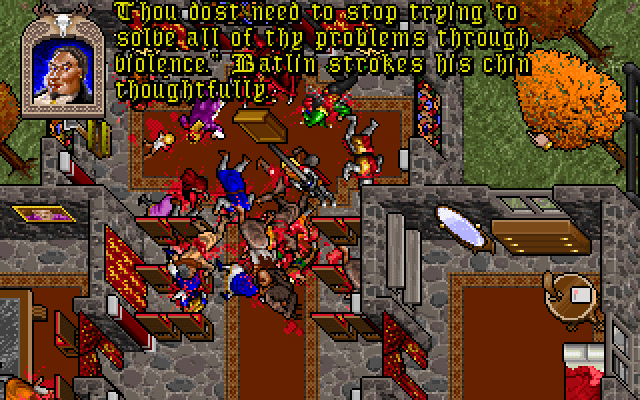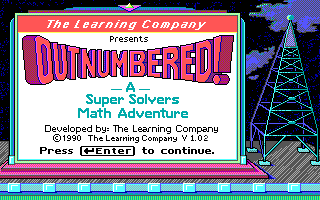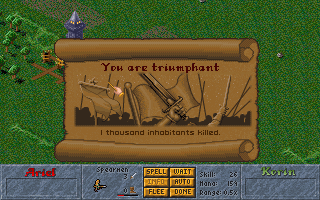When I was first asked to join team AcaGameia eight years ago, I was just a lifelong gamer with a lot of passion for my hobby. My friend, our team captain, asked me to join and help the team raise money for Flint’s Hurley Children’s Hospital. I lived over a thousand miles away and was,
Tag: Video Games
Recollecting: Ultima 7

I nitpick a couple of aspects of Ultima 7, but only because I care.
Recollecting: Outnumbered!

Come with me to the old days of educational video games.
Recollecting: Master of Magic

A.K.A.: Imperialism… IN A FANTASY WOOOOOORLD!
Recollecting: Master of Orion 2
Yesterday’s Expansion Pack has me thinking a lot about technological advancement, so come with me as I muse about that classic 4X space strategy game, Master of Orion II. MoO2’s “tech tree” is really just eight parallel lines representing different fields of scientific advancement, from biology to physics to sociology. There is no cross-pollination between
Expansion Pack: Timeline: Inventions
This feature is a companion to my board game reviews on the Extra Life Community Blog. You can find my review of Timeline: Inventions here. One of the interesting patterns that arose as I was playing Timeline: Inventions was the way in which people would be wrong. More often than not, when someone guessed at
Greenlight Spotlight: Contrast
Having established the sort of games on Greenlight I downvote to oblivion and why last week, I will now move on to highlighting games I think deserve your attention. Before I do that, though, I will note that Steam has made the user interface for Greenlight a bit more friendly, offering to generate you a
Counterfactuals and Teaching
Wo ho ho ho, a post from Tim?! It cannot be! Yes, I am once again attempting to maintain the subtle illusion that this blog is a two-man effort, instead of allowing Seth to shoulder all the weight of our page views. Luckily for me, today there occurred an eclipse of two arcane events. The first
The Ethics of Transhumanism in Deus Ex: Human Revolution
Deus Ex: Human Revolution, like any good piece of science fiction, explores the future to comment on current issues as well as issues that might arise from proposed or envisioned technologies. The game uses its concept of “mechanical augmentation,” or advanced prosthesis that restore or enhance human capabilities to explore a variety of issues. One issue explicitly explored is the ethical problems that arise when doctors are forced to make far reaching decisions about the health and quality of life of a patient whose life is in danger and who is unable to give consent due to being unconscious. Adam Jensen’s “bionic man” montage is peppered with snippets of conversation dropping lines like “He doesn’t need that,” indicating that decisions about what to keep and what to replace are being made without his input. This problem is continually invoked by the game, both in Jensen’s own ambivalence to his augmented state (spawning the viral meme “I never asked for this.”), and in a side quest where Jensen discovers a man who has been shot in the gut and is paralyzed from the waist down and wishes to be euthanized rather than get augmented legs to restore his ability to walk or spend his life in a wheelchair. Jensen (and therefore the player), faced by a man who has the opportunity to make the decision that was made for him, has the option of complying with the man’s wishes and giving him a lethal dose of morphine, talking him out of his desire to die, or simply leaving him and calling an ambulance. In this way, the game addresses quality of life issues and the right to die in a thoughtful manner and asks the player to make (or avoid making) a decision.
An interesting issue that is almost entirely subtextual in the game, on the other hand, is the question of how the ability to enhance human capabilities can be turned into an excuse to shape other human beings for our own benefit. Arguably, the really ethically questionable part of Jensen’s augmentation is not that his organs and limbs were replaced without his consent, but that the augmentations went so far into making him into an unstoppable killing machine. The current idea of prosthesis is to, as much as possible, restore the functionality and quality of life lost, and our current level of technology generally falls short of this goal. Mechanical augmentation in Deus Ex:HR is capable of completely restoring functionality, but the augmentations given to Jensen go far beyond that. They don’t just replace his arms–they give him arms with hidden blades that are capable of punching through walls. They don’t just restore his vision, they give him eyes capable of seeing through walls, and so forth. Jensen’s employer, David Sarif, essentially turns him into his own private super-commando, treating him as a tool to be shaped towards his own ends. Surprisingly, the question of how much this cost and whether Jensen is obligated to stay with Sarif industries until that liability is equalized is never raised. Nor are the ethics of enhancing Jensen beyond human capabilities without his consent really raised except in a couple of snippets of text you can easily miss if you don’t go snooping around hacking into other people’s computers and poking about the back area of the local LIMB clinic. This idea is raised in a side quest in Hengsha which deals with prostitutes being forced into augmentations for the pleasure of their clients, and it is also briefly invoked by the anti-augmentation figure Bill Taggert in the latter stages of the game, but it is rather surprising that Jensen himself doesn’t raise the question of whether they could have installed basic augmentations and asked him about going further after his life was saved instead of implanting a prototype explosive device in his arm while he was unconscious.
If technology moves in this direction, either in the field of prosthesis or in genetic engineering, this is a central issue that will have to be addressed. Is a life threatening accident or the loss of a limb an excuse to make someone “better” than human? What happens when “augmentation” (whatever its form) becomes a requirement to certain jobs, or for promotion within certain careers? Will people of lesser means attempting to improve their lot be forced to take on loans or enter into what is essentially indentured servitude to afford the means for upward mobility? Or are we already dealing with this issue now, in the mushrooming student loan debt and the reliance of small businesses on credit to get off the ground?
Assassin’s Creed III and British Villainy
Recently, Boston historian J.L. Bell was interviewed by Radio Boston about the upcoming contribution to Ubisoft’s series Assassin’s Creed. The newest entry is set in the years surrounding the American Revolution, and follows the life of half-Mohawk half-English Connor Kenway. One of the many interesting aspects of this game is how often the developers, in
Continue Reading “Assassin’s Creed III and British Villainy”



